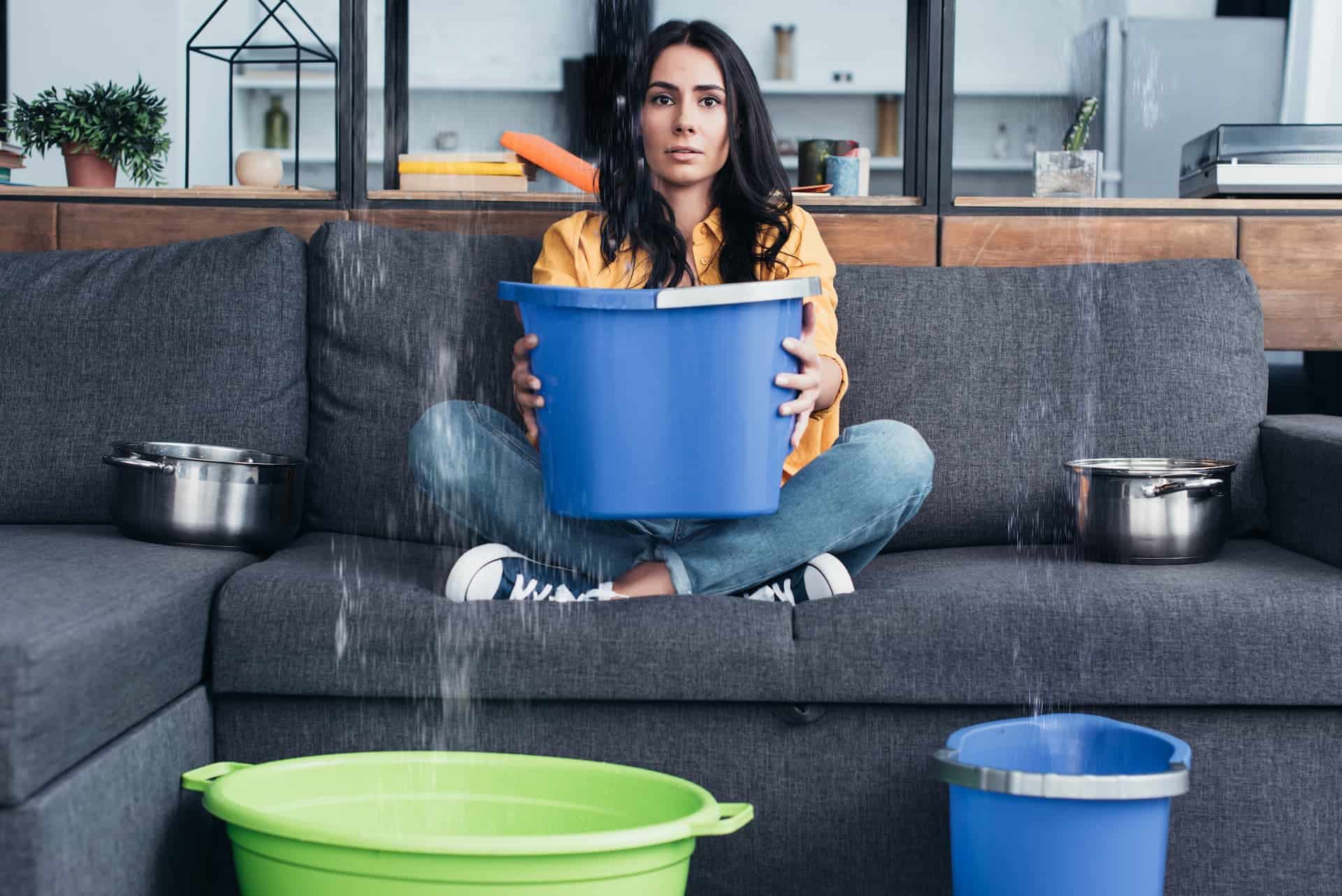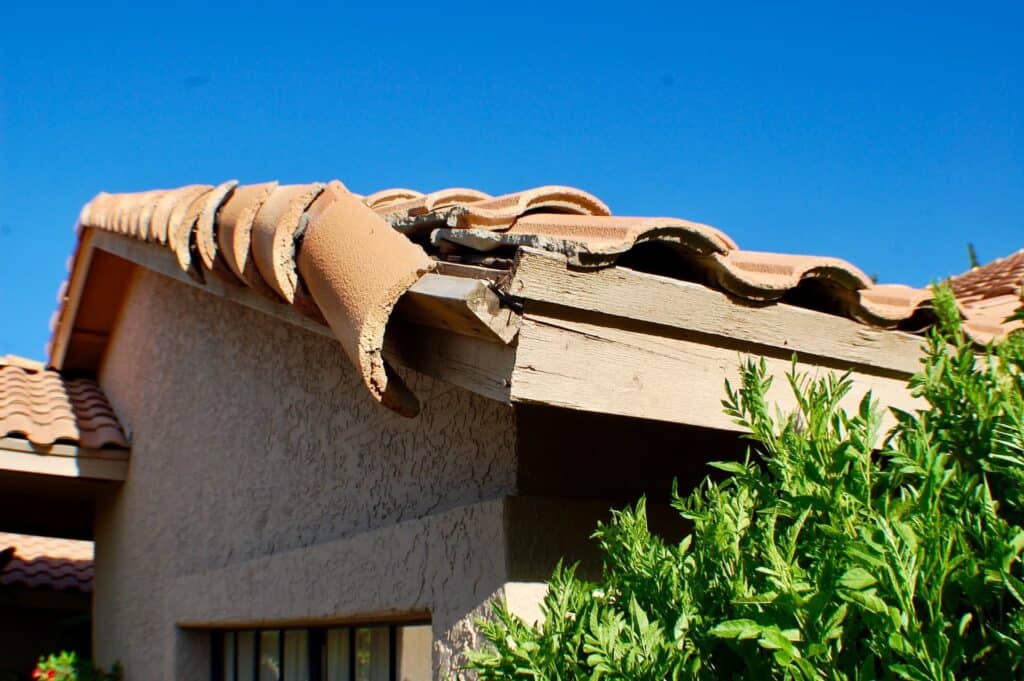
Does Your Roof Leak in Heavy Rain? Read This!
GET A FREE INSPECTIONFree Roof Inspection
Does your roof leak in heavy rain? That’s not a good sign! A properly constructed roof that’s in good condition doesn’t leak, so the minute you spot a leak, make sure to schedule a free inspection with a reputable roofing company. Here’s what you need to know about roof leaks and the prevention of property damage.
A roof leak is one of the most common causes of roofing complaints.
Sometimes the roof will leak any time it rains. In some cases, though, you’ll only notice the leak during heavy rains.
Does a roof that only leaks in heavy rain mean the roof leak isn’t serious? Nope, that’s a common misconception. If your roof is leaking at all, it’s time to get it inspected.
What Can Cause a Roof to Leak in Heavy Rain?

There are a range of possible reasons why your roof tends to leak during heavy rain. Your roof may be leaking because of one or a few of the following reasons:
Skylight Leakage
Skylights are meant to bring in extra natural light to your house, not water. They tend to make your space look brighter and more spacious. On the other hand, if you don’t close your skylight properly during heavy rain, it may leak. Even if your skylight is closed properly, there may be gaps around the framing or flashing. There also might be condensation dripping off a skylight that hasn’t been properly insulated.
Chimney Leakage
A house with a chimney is more prone to roof leaks than a house without one. Rain can get into the house through the chimney itself. Also, there are instances when the angle flashing or the shingles around the chimney has damages which may result in leakage.
The angle flashing is basically the piece of metal that surrounds the chimney. While it is originally designed as a watertight seal, the angle flashing can pull away from the chimney due to deterioration or improper insulation.
Metal corrosion
Cracks in metal and corrosion around fasteners can lead to water leaks. Over time, metal roofs tend to loosen due to expansion and contraction. This may result in water leaks during heavy rain. This is usually the case in houses wherein the metal roof is not maintained regularly.
Degrading or damaged shingles
Shingles are originally designed to protect your home from different elements, such as the scorching sun and the harsh snow. Over time, roofing shingles dry out and reach the point where they can no longer keep water out. Once the shingles are near their breaking point, they may cause some leaks on your roof. This is especially true if you have shingles that have been damaged by hail, wind, or debris.
Condensation
Attics that don’t have a proper ventilation system allow moist and hot air to be collected. The moisture drips into the attic, and eventually to your ceiling. This is amplified during heavy rains.
How Big of a Problem is a Leaking Roof?
What happens if you don’t repair your leaking roof?
First of all, the water can damage the attic or rooms on the highest floor and all the items in these rooms. This is especially devastating since these are the spaces where you typically store valuable items or family keepsakes.
A leaking roof can also lead to mold and mildew if left unattended to. These may cause serious health problems, especially to people with respiratory problems such as asthma and nasal congestion. Mold spores might also trigger allergic reactions, which can lead to severe health ailments. Even if you and the rest of the household have no health problems, you can’t say the same about future guests in your house.
Aside from damage and mold, there’s also fire hazard involved. A leaky roof may lead to a fire threat from shorted wires. This can be the most devastating side effect of a roof leak and is one reason roof leaks should be taken very seriously.
The most common problem caused by a leaking roof is damaged rafters and wall framing. This may sound trivial and even an easy fix to some people, however, this is a problem that gets worse and worse – and more costly – the longer it lingers.
While it may take time for a leaking roof to lead to such consequences, you don’t want things to escalate. The costs will only increase over time if you don’t do anything about the issue.
Does Insurance Cover Roof Leak Repair?
On the bright side, your home insurance policy generally covers roof leaks and other damages to your roof. This is as long as the source of the said damage is not specifically excluded in your policy.
On the other hand, your insurance doesn’t cover roof leaks caused by a lack of roof maintenance or natural wear and tear to the roof over time. It’s best to look over your home insurance policy thoroughly to determine if your insurance will shoulder the expenses of roof leak repairs. It’s equally important that you can prove the reason behind the roof leak as well.
We don’t recommend that you try to find the source of the leak yourself, especially if you’re considering going up on your roof. Roofing professionals can do an inspection for you. At roofclaim.com, we offer a free inspection and can easily pinpoint the root cause of your roof leak.
Can I Fix a Roof Leak Myself?
We never recommend that a property owner attempt to fix a roof leak themselves. Not only is it dangerous to go up on your roof, but your attempted repairs could end up causing additional damage that can void your insurance claim.
Damage caused by the property owner is typically not covered by your home owner’s insurance policy. For this reason, it’s best to seek the help of a roofing professional.
We need to examine the extent of the damage and document it as an independent 3rd party to make sure you have the greatest chance of filing a successful insurance claim. We can also advise you on whether it’s best to do a roof repair vs a roof replacement.
If you feel confident in your abilities and have experience working on roofs, here are some steps you can take to fix a roof leak:
- Identify the source of the leak: The first step in fixing a roof leak is to identify where the water is coming from. Look for any signs of water damage or mold on the ceiling or walls, and trace the water stains back to their source on the roof.
- Clean the area: Once you have identified the source of the leak, clean the area around it. Remove any debris, dirt, or leaves that may be obstructing the flow of water.
- Apply roofing cement: Use roofing cement to seal the leak. Apply a thick layer of roofing cement over the area where the leak is located, making sure to cover the entire damaged area.
- Use a patch: If the leak is in a larger area or if there is a hole in the roof, you may need to use a patch to cover the damaged area. Cut a piece of metal flashing or another sturdy material to fit over the damaged area, and use roofing cement to secure it in place.
- Check your work: After you have completed the repair, check your work to ensure that the leak has been fixed. Wait for a rainy day to test your repair, and check for any signs of water entering the building.
What Should You Do if Your Roof Leaks in Heavy Rain?
While you should leave the roof repair to the professionals, this doesn’t mean you should just sit idly while your roof is leaking at home. Here are some steps you can take in the meantime:
1. Find the source
If you can find the source of the leak – or at least the extent of the leak – then you can take steps to protect your property from further damage.
2. Clear the area
For professionals to properly address the leak, the area needs to be clear from clutter. This is necessary to protect your belongings while ensuring there is enough space to work on the roof leak when the pros arrive.
3. Try to contain the water
Grab a bucket to catch the leaking water. If you don’t have a bucket you can use any sort of plastic container, like an empty storage tub. You should also mop up or dry the area with towels to avoid possible accidents and water damage.
4. Call the professionals
In case of roof leaks, you should seek the assistance of professionals. roofclaim.com offers fast, free roof inspections (often times the same day).
If you need extensive repairs or a roof replacement, our team of expert professionals is here to manage your project from beginning to end, giving you peace of mind that your roof is in good hands.
Rest assured that we only use top-rated roofing contractors so your project is always handled by the most qualified professionals in the industry. With a five-star reputation in the roofing industry, you can never go wrong with RoofClaim.
The Bottom Line
If your roof is leaking due to heavy rain, don’t wait for the damage to get worse. Schedule a free inspection with us. We’ll make sure you’re well taken care of so you can get back to living your life.

